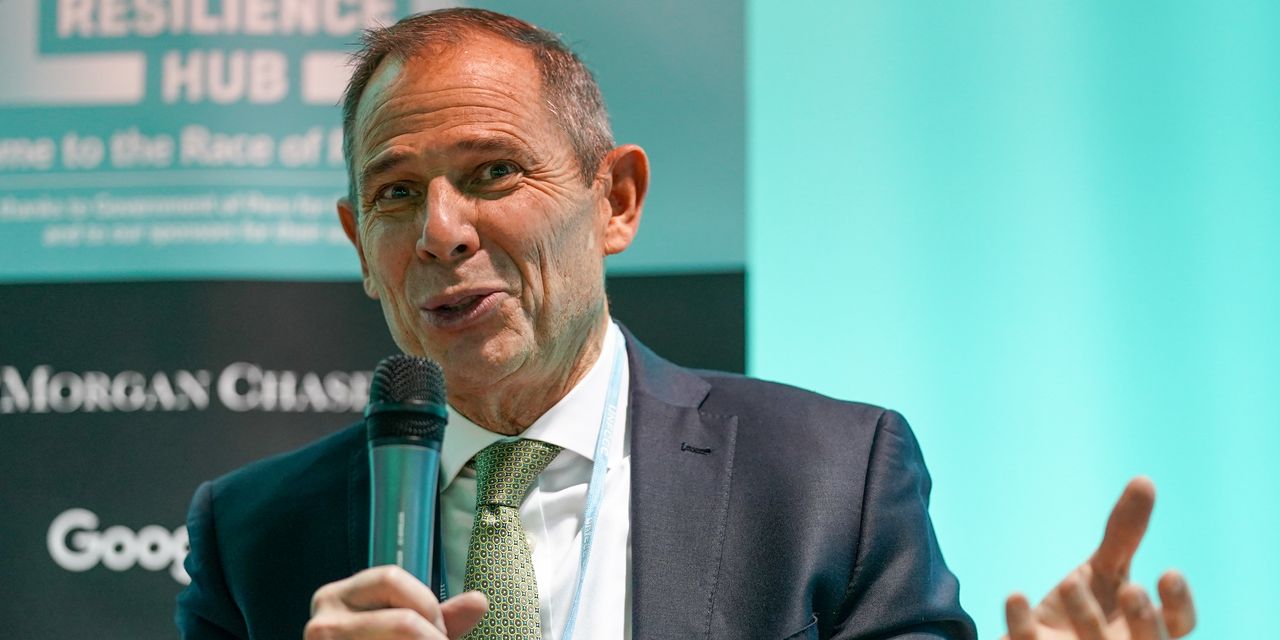U.S. Rep. John Curtis of Utah spends a fair amount of time convincing voters and politicians on the right and the left that he, representing an historically coal, oil and gas-producing section of his state, is truly “a climate guy.”
“Conservatives must engage in the climate conversation,” Curtis, a Republican, told MarketWatch in a recent interview as he prepared to recruit more “climate guys,” as he frames it, at the second annual Conservative Climate Summit, held in his home state.
“We conservatives, unfortunately, do a better job of telling people what we don’t like versus what we do like when it comes to slowing global warming — an economically-minded energy transition that supports U.S. political security,” he said.
Read: Ramaswamy calls climate change a ‘hoax.’ Then the topic all but disappears from the Republican debate.
And: Where the candidates stand: How will energy, climate change and EVs feature in the first Republican debate?
Other Republicans have championed supporting greater U.S. oil
CL00,
and gas
NG00,
drilling, to round out a diverse energy portfolio that could position the country as less reliant on, for instance, Russian natural gas, or the whims of OPEC’s oil-supply spigot. Doing so, they say, not only boosts the local economies built on these industries, but leaves the U.S. less vulnerable to geopolitical chess games.
Read: California passes first-in-nation law requiring big companies to report all emissions
Policy folks who want a faster shift to solar and wind power
TAN,
as well as green hydrogen and nuclear, the latter two of which have a slimmer slice of the overall energy market today, see a more-secure U.S. thriving when the nation can control local and regional green-energy use. This is just what solar and wind, long-term battery storage and other technologies can provide, depending on the region, they argue.
‘Reverse the conservative narrative’
Select Republicans say they aren’t against an all-of-the-above approach. They just believe natural gas
NG00,
for instance, will have to persist for several years to make energy affordable for homes and businesses. And Republicans, as well as President Joe Biden and private-sector powerhouses including Amazon.com
AMZN,
want to funnel money into carbon capture and storage, which allows oil-and-gas concerns
XOM,
CVX,
to combust energy mostly as usual, then capture the carbon dioxide emissions at the point of combustion, store them deep in the ground or turn that waste into new energy products. Yet another type of direct carbon capture “vacuums” existing pollution from the air, but is only now growing.
Related: Climate change and carbon capture: Texas, Louisiana score federal money for largest-ever U.S. direct-air effort
Carbon dioxide and other greenhouse-gas emissions created by human activity have been scientifically proven to be speeding up climate change, the atmospheric phenomenon contributing to things like deadly extreme heat, more expensive food and acidifying, rising oceans that threaten coastal communities.
Related: It’s official: This summer was the hottest on record
Curtis, a four-term congressman who has represented Utah’s 3rd Congressional District since 2017 and was the former mayor of Provo, has long made a case for energy innovation and environmental conservation as vice chair of the Energy, Climate and Grid Security and Federal Lands subcommittees, and as the founder of the House’s Conservative Climate Caucus, launched in 2021.
“I’m not going to ask you to leave your conservative credentials at the door today,” Curtis said, kicking off the event that hosted some 350 attendees, according to local news sources. “But I do ask that you come with an open mind. I do ask that you reverse the narrative that somehow we don’t care about this Earth.”
As for the left? Curtis repeated his view to attendees that fossil fuels, especially so-far nascent but evolving renewable natural gas, must be part of the ongoing transition to cleaner and more-efficient energy; that discussions of reduced carbon emissions must be placed within a worldwide context, keeping in mind that fossil fuels are essential for progress in developing countries; and that it is counterproductive to jump on climate policies that “feel good” but don’t get at the root of the problem, according to the Deseret News.
Don’t miss: Republican presidential candidate Tim Scott says he wants to put the focus on tax cuts
No future without nuclear power
Curtis told MarketWatch that reviving investment in the nation’s nuclear-power capabilities, which creates zero emissions, is a bipartisan topic.
“We can’t have an energy future without a lot of nuclear,” he said.
And he said diverting funding to traditional nuclear plants, or reactors, at the expense of spending on new nuclear technology that includes small modular reactors, or SMRs, would be a “huge mistake.”
Drawing the public’s attention to nuclear advancement can help educate and soothe safety concerns, he said. SMRs essentially replicate, although on ground, the Navy’s nuclear-powered submarines, which have been historically accident-free.
Nuclear-sector growth is already happening, he said, highlighting nuclear interest at Berkshire Hathaway
BRK.B,
-owned utility PacificCorp., which through its Rocky Mountain Power division, has consolidated utility service in Utah and elsewhere in a big western area. Curtis’s Utah has also focused on its extensive underground salt formations that offer a natural and secure environment for storing various energy resources, including conventional fuels, as well as green hydrogen.
Read: Modern-day Oppenheimers see the future of nuclear energy — and it’s mobile
And the future of the climate-focused IRA?
MarketWatch asked Curtis if there were aspects of the climate-focused Inflation Reduction Act that he or Republicans liked. Proponents of the IRA cheer its roughly $360 billion —$121 billion in direct spending and $235 billion in tax credits — in government initiatives meant to speed the energy transition away from oil, including from gas vehicles to EVs
TSLA,
and from gas appliances to electric options.
“There were state-specific provisions that Republicans liked,” he said. “But we were never part of the conversations and it was an awful lot of money.”
It’s pretty clear that conservatives do line up for targeted federal funding, even if they bristled at the IRA’s price tag.
Outgoing U.S. Rep. Chris Stewart, who represented another Utah district, was also a Conservative Climate Summit participant. He said a highlight from his time as a U.S. lawmaker was climbing atop a “300-foot” wind turbine at the Milford Wind Corridor in southern Utah, which Stewart helped fund by securing $140 million in federal support from the U.S. Department of Energy.
The GOP, with no members voting for the IRA as written at passage, is primed to slash the IRA’s green spending — spending that elevated Biden on the global stage — should Republicans win back power in the 2024 election.
Bottom line for Rep. Curtis? It will take the private sector to do much of the heavy lifting.
“We cannot demonize the fossil-fuel industry,” he said. “They’re spending billions to capture carbon, to make green fuels. I’ve seen with my own eyes a zero-emissions natural gas plant. We have to change the paradigm to keep them at the table.”
Read the full article here













Leave a Reply